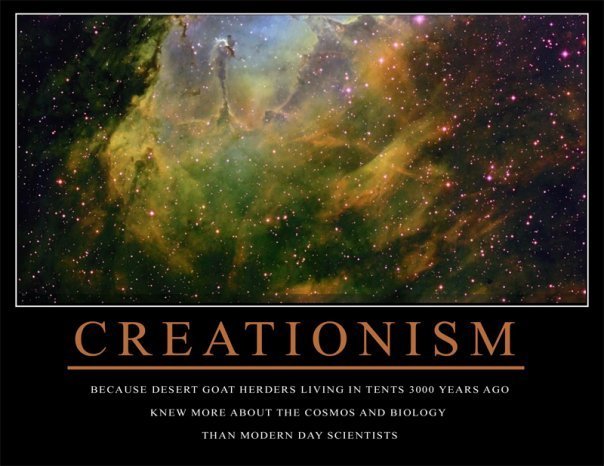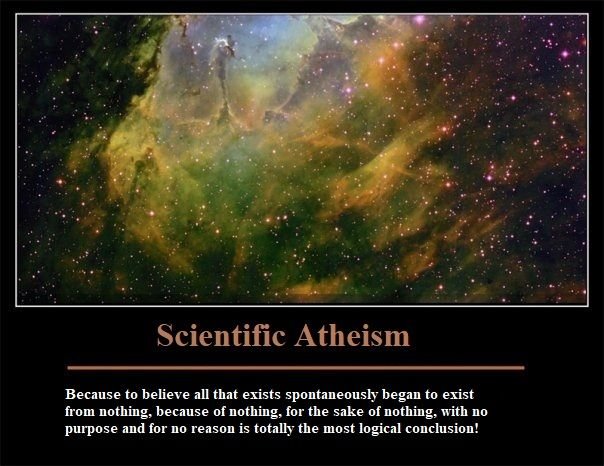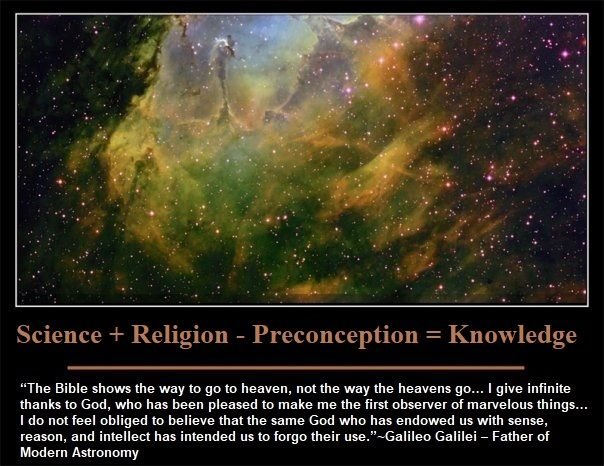The only reason religion and science seem to be at odds today is because the only thing either side can agree on is that the the other is wrong. The fundamentalists presume that the bible is meant to be interpreted literally. This forces them to reject any scientific discoveries that do not mesh with their preconceptions. What atheists don't realize is that they are inversely guilty of the same thing. They base their total rejection of the bible on the same literal interpretations! And, since science so easily debunks what they think the bible "says," they don't see any reason to learn what it actually means. No, they just lump all theists into the same category of people who's opinions are unworthy of consideration by default. Any objective theological study is out of the question since we already know that "spaghetti monsters" and "fairy sky-men" don't exist. This total rejection that is based on a willful lack of understanding makes the atheist's position no more logical than that of the opposition. The fundamentalists say "science is wrong because the bible says..." The atheists say "the bible is false because science has shown..." Both sides are working under presumptions that only serve to perpetuate the logical fallacy of the false dilemma. The biggest tragedy is that neither side seems to realize they are flip sides of the same coin.
Let's be frank. If you find this meme offensive, you have only yourself to blame for its existence:

How about this one:

Oh darn. Didn't see that one coming. I propose a third, more reasonable option:

To recognize objective reality/truth more completely, three elements must work together. Science, religion, and philosophy. Imagine a three legged stool where one supports the other, while all three together provide a sturdy platform where truth can be clearly seen by all. Although our understanding of truth grows over time with every new discovery, truth itself remains unchanging and always visible. Religion without science is superstition. Science without religion is unethical. Philosophy without religion is devoid of substance. Only when all three work together can we begin to fully comprehend ourselves and our relation to all things. Science works to explain the material, religion reveals purpose, and philosophy is what ties it all together. Remove one leg and the stool topples over leaving pieces of the truth scattered about. When this happens we are reduced to gathering up the most convenient pieces which we assemble however it suits us. Now we can only see our own peculiar version of what truth is. Our understanding has now been reduced to a model that is incomplete, undefinable, and hopelessly distorted by personal bias. Sound familiar?
@ryeis1
Good content
Keep sharing good posts!
Thanks! I appreciate the feedback.
I find this topic very interesting. I believe science in a journey in discovery. Every stage of science over the generations has proven new understand and sometimes disproven old understandings. I believe the Bible is something we as humans are endlessly going to be understanding at deeper and truer levels the longer we study it. I believe full understanding of both subjects would show that they agree completely with each other, but we have no way of knowing how long it will take to truly have full understanding of either or both
Great, pity its too late to vote on it.
Thanks.
Agreed! Following for more great stuff like this!
I would say the break between religion and science is prevalent in western society due to how religion became the corner stone of politics with papal monarchy and how it lead to religion becoming state doctrine based on pseudo literal interpretation to backup politucal power rather than personal enlightment and philosophy, and light century backed by free masonery with republican ideal of meritocracy got in conflict with papal monarchy, and blood right and nobility, more than on fundamental on faith, or monotheism or theism.
I disagree. I think the break came as a direct result of Luther's sola scriptura doctrine which paved the way for fundamentalism. It's fundamentalist ideals and ridiculous beliefs that all religion seems to get lumped in to. I mean how do you reason with someone who insists that dinosaurs were on Noah's ark 4000 years ago and all scientists are united in conspiracy or just plain wrong "because the bible says...?"
Catholics were already doing this on their own centuries before luther, supporting monarchy and divine / blood right, it doesnt have much to do with luther .
Fundamentalism existed even before christianism.
I've heard this many times and no one can seem to provide any historical evidence for the claim. The Baptist's Trail of Blood makes the same claim, but there is nary a sermon preserved from the first century that documents Christianity other than what was documented by the Catholic Church. This has all been meticulously documented for 2000 years and there is no mention of "divine / blood right" other than the ravings of fundamentalist preachers in the 20th century. If there is something I'm missing, I'd sure like to know.
It start with 4th century with the first french kings lineage, in cahoot with the pope commanding french armies.
Can you direct me to a link or maybe an author? The fundamentalist argument always boils down to "because the bible says..." This is circular reasoning. Christianity didn't spread across the known world like wildfire with a logical fallacy as a foundation. Also, sola scripura wouldn't work either since most people were illiterate until well into the 20th century. So, that's why I'm curious to see if anyone can produce proof of the very outrageous anti-Catholic rants. Just so anyone will know where I stand and to define terms, here's a couple things I've written on this subject.
https://steemit.com/catholic/@ryeis1/a-simple-guide-gauranteed-to-improve-your-chances-of-evangelizing-catholics-written-by-a-catholic
https://steemit.com/religion/@ryeis1/divine-revalation-or-man-s-imagination-how-do-you-know
https://en.m.wikipedia.org/wiki/Merovingian_dynasty
During the final century of Merovingian rule, the kings were increasingly pushed into a ceremonial role. The Merovingian rule ended in March 752 when Pope Zachary formally deposed Childeric III.[1][2] Zachary's successor, Pope Stephen II, confirmed and anointed Pepin the Short in 754, beginning the Carolingian monarchy.
....
Christianity was introduced to the Franks by their contact with Gallo-Romanic culture and later further spread by monks. The most famous of these missionaries is St. Columbanus (d 615), an Irish monk. Merovingian kings and queens used the newly forming ecclesiastical power structure to their advantage. Monasteries and episcopal seats were shrewdly awarded to elites who supported the dynasty. Extensive parcels of land were donated to monasteries to exempt those lands from royal taxation and to preserve them within the family. The family maintained dominance over the monastery by appointing family members as abbots. Extra sons and daughters who could not be married off were sent to monasteries so that they would not threaten the inheritance of older Merovingian children. This pragmatic use of monasteries ensured close ties between elites and monastic properties.
At least clearly around 6th century there were dynasties of kings organized around the pope and christian ceremonials to lead french armies, but i think it was even since begining of french dynasties.
This problematics remind me of the veil of isis from blavasky.
https://en.m.wikipedia.org/wiki/Isis_Unveiled
Isis Unveiled: A Master-Key to the Mysteries of Ancient and Modern Science and Theology, published in 1877, is a book of esoteric philosophy and Helena Petrovna Blavatsky's first major work and a key text in her Theosophical movement.
Isis Unveiled is argued by many modern scholars such as Bruce F. Campbell and Nicholas Goodrick-Clarke to be a milestone in the history of Western Esotericism.[2] Blavatsky gathered a number of themes central to the occult tradition—perennial philosophy, a Neo-Platonic emanationist cosmology, adepts, esoteric Christianity—and reinterpreted them in relation to current developments in science and new knowledge of non-Western faiths. In doing so, Isis Unveiled reflected many contemporary controversies—such as Darwin's theories on evolution and their impact on religion—and engaged in a discussion that appealed to intelligent individuals interested in religion but alienated from conventional Western forms.[3] Blavatsky's combination of original insights, backed by scholarly and scientific sources, accomplished a major statement of modern occultism's defiance of materialist science.